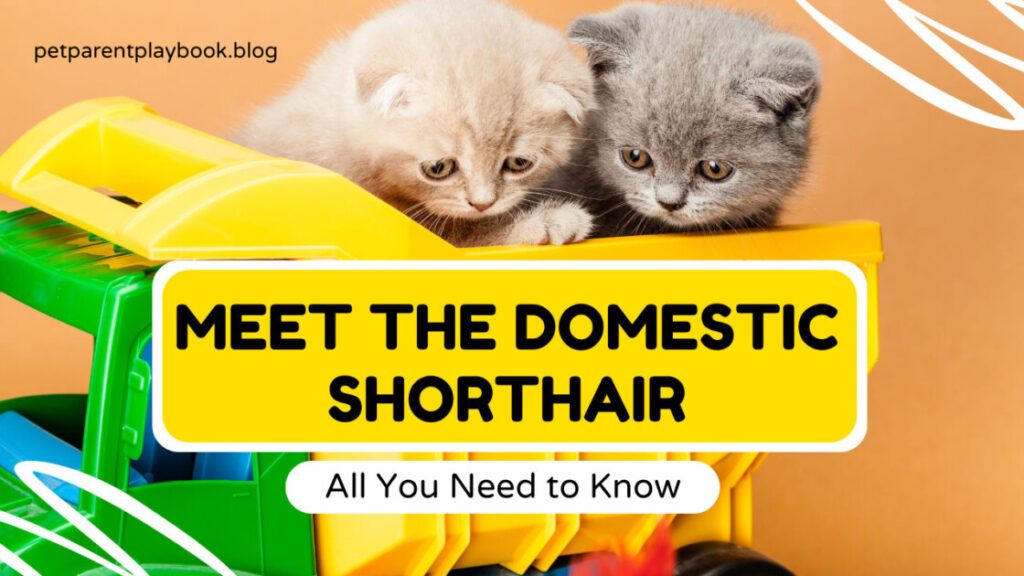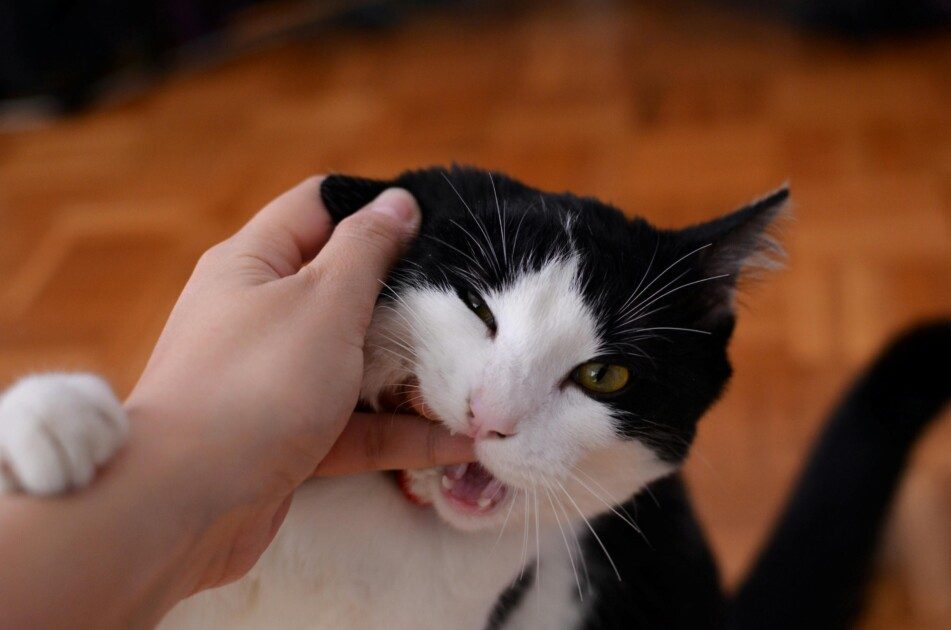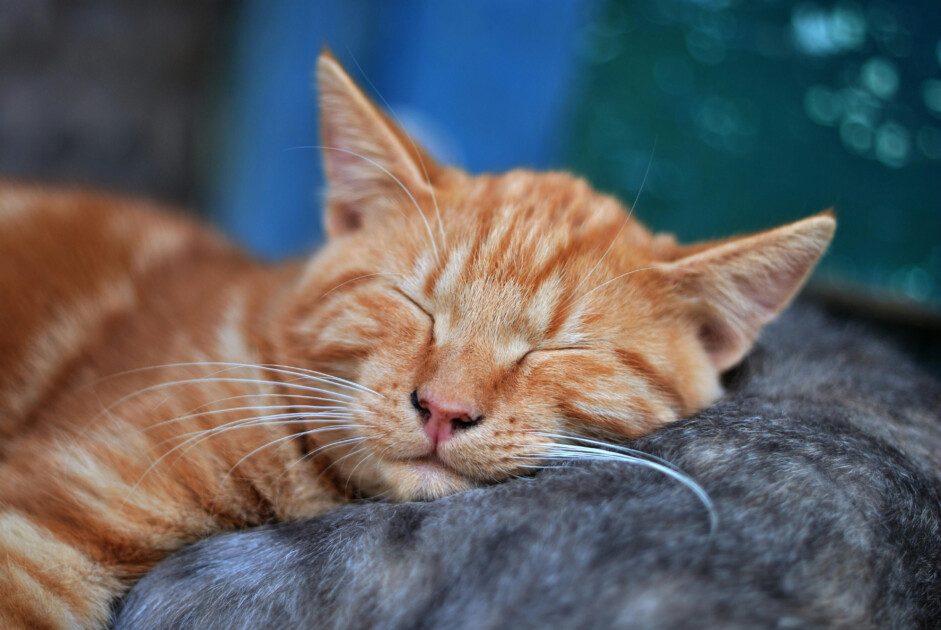The Domestic Short Hair (DSH) – a ubiquitous feline fixture gracing homes worldwide – might seem like the quintessential “cat next door.” But beneath their unassuming exterior lies a captivating blend of independence, affection, and adaptability. This comprehensive guide delves into everything you need to know about these furry companions, from their fascinating history to their playful personalities. We’ll also answer the burning question on every potential cat owner’s mind: “Are domestic shorthair cats hypoallergenic?”

A Tapestry of Breeds: Unveiling the Domestic Shorthair’s Heritage
Unlike their pedigreed counterparts like Persians or Siamese, domestic shorthairs aren’t a single breed. Instead, they represent a diverse category encompassing mixed-breed cats with short fur. Centuries of natural selection honed their hunting instincts and adaptability, allowing them to thrive in various environments. Think of them as feline mutts, each one a unique blend of genetics passed down through generations.
This very lack of a single breed standard is part of what makes Domestic Short Hair cats so captivating. You never quite know what you’ll get! Here’s a glimpse into the possible origins of these fascinating felines:
- Early Encounters: Evidence suggests that cats with similar characteristics to Domestic Short Haircuts were present in the Middle East around 7,000 BC. Likely attracted by the abundance of rodents near human dwellings, these early feline companions played a crucial role in pest control, forming a mutually beneficial relationship with humans.
- From Mousers to Companions: Over time, Domestic Short Hair cats transitioned from working mousers to cherished companions. Their adaptability and independent nature allowed them to thrive in various environments, from bustling farms to cosy homes. Today, Domestic Short Hair cats remain one of the most popular feline breeds worldwide, gracing homes with their unique personalities and captivating presence.
Domestic Shorthair Personality: More Than Meets the Eye
Domestic shorthairs may not crave constant attention like some breeds but don’t mistake their independence for aloofness. These cats form strong bonds with their humans and enjoy a good cuddle session on the couch. Their playful spirit is a constant source of entertainment. Their natural hunting instincts translate into playful antics – chasing feathery toys, stalking dust bunnies across the floor, or launching surprise attacks on unsuspecting ankles.
Here are some endearing personality traits that define Domestic Short Hair cats:
- Independent Yet Affectionate: DSH cats value their alone time but can form strong bonds with their humans. They enjoy affection on their own terms, often initiating cuddle sessions when they desire attention.
- Playful Prowess: Their natural hunting instincts translate into playful antics, keeping them and their owners entertained. Engage them with interactive toys to channel their hunting energy and provide mental stimulation.
- Adaptable Charmers: DSH cats thrive in various living situations, from bustling city apartments to quiet suburban homes. Their adaptability makes them ideal companions for a variety of lifestyles.
- Vocal Communicators: These cats use an array of meows, purrs, chirps, and trills to express their needs and emotions. Learning to “speak cat” becomes a fun part of being a DSH owner!
Domestic Short Hair Mix: A Celebration of Uniqueness
The beauty of DSH cats lies in their remarkable variety. Since they are a mix of various breeds, their fur comes in a stunning array of colours, patterns, and textures. Imagine sleek black cats with piercing yellow eyes, playful tabby youngsters with stripes galore, or ginger DSH mixes with a touch of mischievous glint. It’s a kaleidoscope of feline beauty!

- A Rainbow of Coats and Colors: Domestic Short Hair mixes come in a stunning array of fur colours, patterns, and textures. Solid colours like black, white, ginger, and blue are popular choices. Tabby patterns with stripes or spots add a touch of whimsy, while bi-colour (tuxedo) cats boast a charming contrast of dark and light fur. Calico and tortoiseshell patterns showcase a captivating mosaic of black, orange, and cream.
- Unpredictable Personalities: Mixing breeds can lead to unexpected personality combinations, making each DSH mix unique. Some might be more on the cuddly side, while others might retain a stronger independent streak. This element of surprise adds to the charm of adopting a Domestic Short Hair mix.
- The Joy of Rescue: Many DSH mixes reside in shelters, waiting for their forever homes. Consider adopting and giving a deserving cat a loving home. Shelters provide essential care for these animals and adopting not only saves a life but also allows you to welcome a unique and loving feline companion into your life.
The Hypoallergenic Question: Demystifying Dander
Ah, the million-dollar question for allergy sufferers: “Are domestic shorthair cats hypoallergenic?” The truth is, there’s no such thing as a truly hypoallergenic cat. Cat allergies typically stem from a reaction to a protein (Fel d 1) found in cat dander (dead skin flecks).
However, some good news for allergy sufferers! DSH cats, with their shorter fur, might produce less dander compared to some longhaired breeds. This can potentially translate to fewer allergy triggers. Remember, every individual’s allergies are unique, so consulting an allergist is crucial before welcoming a feline friend into your home. There are also ways to manage allergies, like:
- Regular Grooming: Regular brushing helps remove loose fur and dander, reducing allergens in your home environment.
- Air Purifiers: Investing in air purifiers with HEPA filters can help capture airborne allergens, including cat dander.
- Washing Hands: Wash your hands thoroughly after interacting with your cat to minimize allergen transfer.
- Keeping Your Cat Off Furniture: Limit your cat’s access to furniture where you spend most of your time, such as your bed or couch. This can help reduce exposure to allergens.
Living with a Domestic Shorthair: Essential Care
Once you’ve decided to welcome a DSH cat into your life, here are some essential care tips to ensure their health and happiness:
- Diet and Nutrition: Choose a high-quality cat food appropriate for your Domestic Short Hair cat’s age and activity level. Consult your veterinarian for personalized recommendations. Kittens require a different nutritional profile than adult cats, and senior cats might benefit from a diet formulated for their specific needs. Look for cat food rich in protein, essential fatty acids, and taurine, an amino acid crucial for feline health.
- Veterinary Care: Regular checkups and vaccinations are crucial for maintaining your cat’s health. Schedule annual vet visits to ensure your feline friend stays happy and healthy. These visits allow early detection of any potential health issues and enable your veterinarian to provide preventive care, including parasite control and dental cleanings.
- Scratching Posts and Playtime: Domestic short-haired cats retain their natural hunting instincts. Provide scratching posts to save your furniture and engage in interactive playtime using feather wands, catnip-filled toys, or laser pointers. This keeps them mentally stimulated and helps prevent boredom-induced mischief. Aim for at least 15-20 minutes of playtime daily.
- A Loving Environment: While Domestic Short Hair cats value their independence, they also crave affection. Shower them with love, create a safe haven for them (a cosy cat bed or a designated perch on a windowsill), and respect their independent spirit. Remember, a happy cat is a well-adjusted cat!
The Allure of the Domestic Shorthair: A Rewarding Choice
So, why choose a domestic shorthair cat? Here are just a few reasons:
- Low-Maintenance Companions: Compared to longhaired breeds, Domestic Short Hair cats require less grooming. Regular brushing (once or twice a week) to remove loose fur is generally sufficient. This makes them a good choice for busy schedules.
- Cost-Effective Care: Their overall care needs tend to be less expensive than some other breeds. This can be a consideration for budget-conscious cat lovers. Food, litter, basic vet care, and a few toys are the essentials for a happy DSH cat.
- Lifelong Companionship: With proper care, DSH cats can live for 15-20 years, offering years of love, companionship, and endless entertainment (because, let’s face it, their antics can be hilarious!).
Famous DSH Cat Owners: A Purrfectly Historical Connection
Many celebrities and historical figures have been known to own DSH cats. Sharing a perfect historical connection, here are a few famous feline companions:

- Mark Twain: The renowned author was known for his love of cats and often had a Domestic short-hair companion by his side. His most famous feline friend was a ginger tabby named Whiskers, who was said to be a constant source of inspiration.
- Abraham Lincoln: “Tom,” a tabby Domestic Short Hair cat, was a frequent visitor to Lincoln’s office during his presidency. Tom was known for his laid-back personality and enjoyed napping in the White House chimney corners.
- Queen Elizabeth I: The English queen reportedly had a ginger Domestic Short-haired cat named Ginger that was said to possess a calming presence. Ginger was a constant companion to the queen and even made appearances in some of her royal portraits.
Also Read –
- The Borzoi: Unveiling the Majesty and Mystery of the Russian Wolfhound
- Snuggle Up and Save: The Ultimate Guide to Dog Beds on Sale (Especially for Large Breeds!)
- The Royal Treatment: A Guide to Royal Canin Dog Food (Wet, Dry & More!)
- Is Your Next Best Friend a Mystery? The Unexpected Joy of Mutt Dogs
- The Cutest Cat in the World: A Celebration of Feline Charm 2024-25
Fun Facts About Domestic Short Hairs: Beyond the Expected
Did you know that domestic shorthairs have a surprising claim to fame? Here are some interesting tidbits to add to your feline knowledge:
- Famous Felines: Several iconic cartoon cats, like Garfield the lasagna-loving tabby and Grumpy Cat, the internet sensation with the perpetually grumpy expression, were inspired by the domestic shorthair! Their recognizable features and quirky personalities showcase the charm of these real-life feline muses.
- World Record Holders: Believe it or not, some Domestic Short Hair cats hold Guinness World Records! There’s Stubbs, the honorary mayor of Talkeetna, Alaska, who held the record for the longest-serving elected official (cat, of course) in the world. Stubbs served a remarkable 20 years, bringing a touch of feline charm to local politics.
- Adaptable Survivors: Domestic Short Hair cats are truly adaptable creatures. They can be found worldwide, thriving in diverse climates and environments, from bustling cityscapes to remote island life. This adaptability is a testament to their resilience and resourcefulness, making them true feline survivors.
Conclusion: Welcoming a DSH Cat into Your Life
The domestic shorthair cat – with its captivating blend of independence, affection, and adaptability – offers a rewarding companionship for many. Whether you’re looking for a playful companion, a cuddly lap cat, or simply a furry friend to grace your home with their independent charm, the domestic shorthair might be the perfect feline match for you.
Remember, adopting a Domestic Short Hair cat from a shelter not only gives you a loving companion but also helps a deserving animal find its forever home. So, what are you waiting for? Open your heart and home to the magic of the domestic shorthair!
Important Resources for Your Domestic Shorthair Cat
In addition to the resources mentioned in the FAQ section, here are some additional credible sources to enhance your domestic shorthair cat blog post:
General Care and Information:
- The Cat Fanciers’ Association (CFA): https://ecat.cfa.org/ – While the CFA focuses on pedigreed breeds, they offer general cat care information applicable to DSH cats.
- Cornell University College of Veterinary Medicine: https://www.vet.cornell.edu/departments/cornell-feline-health-center/health-information/feline-health-topics – Provides a wealth of information on feline health, nutrition, and behaviour.
- American Veterinary Medical Association (AVMA): https://www.avma.org/ – Offers trustworthy resources on cat care, including vaccinations, parasite control, and dental health.
Adoption and Rescue:
- The Association of Shelter Veterinarians (ASV): https://www.sheltervet.org/ – Advocates for shelter animals and provides resources for those considering adoption.
- National Kitten Coalition (NKC): https://kittencoalition.org/ – Focuses on the welfare of kittens and finding them forever homes.
- Alley Cat Allies: https://www.alleycat.org/resources-page/ – Champions the welfare of feral and stray cats and promotes humane solutions for community cat populations.
Breed Information (DSH Cats):
- The International Cat Association (TICA): https://www.tica.org/ – While not a recognized breed by TICA, they offer a helpful page on domestic shorthair cats with interesting facts and historical tidbits.
- Veterinary Partner – Domestic Shorthair Cats: https://veterinarypartner.vin.com/default.aspx?pid=19239&catId=102887&ind=587 – Provides a general overview of DSH cats, including their health and temperament.
- Hill’s Pet Nutrition – Domestic Shorthair Cat Breed: https://www.hillspet.com/ – Offers insights into DSH cat personality, care needs, and potential health concerns.
Domestic Shorthair FAQs: Your Quick Guide to These Feline Charmers
1. Are domestic shorthair cats hypoallergenic?
Unfortunately, there’s no truly hypoallergenic cat breed. Cat allergies typically stem from a reaction to a protein (Fel d 1) found in cat dander (dead skin flecks). However, DSH cats, with their shorter fur, might produce less dander compared to longhaired breeds. This can potentially translate to fewer allergy triggers. Consulting an allergist is crucial before welcoming a feline friend into your home. Here are some ways to manage cat allergies even with a DSH cat:
Regular grooming to remove loose fur and dander
Air purifiers with HEPA filters
Washing hands after interacting with your cat
Limiting your cat’s access to furniture where you spend most of your time
2. What kind of personality do domestic shorthairs have?
domestic shorthair cats are known for their independent spirit yet can be quite affectionate on their own terms. They are playful, enjoy interactive toys, and retain their natural hunting instincts. They are also adaptable, vocal communicators, and can thrive in various living situations.
3. How much grooming do domestic shorthairs need?
Compared to longhaired breeds, DSH cats require minimal grooming. Regular brushing (once or twice a week) to remove loose fur is generally sufficient.
4. What are some of the health benefits of adopting a domestic shorthair cat?
Studies have shown that owning a cat can lower blood pressure, reduce stress, and even decrease the risk of heart disease. Owning any pet can encourage a more active lifestyle, and playing with your DSH cat can provide mental and physical stimulation for both of you.
5. Where can I adopt a domestic shorthair cat?
Many animal shelters and rescue organizations have DSH cats waiting for their forever homes. Consider adopting and giving a deserving cat a loving home! Here are some resources to help you find a shelter near you:
The American Society for the Prevention of Cruelty to Animals (ASPCA): https://www.aspca.org/
The Humane Society of the United States: https://www.humanesociety.org/
Petfinder: https://www.petfinder.com/search/dogs-for-adoption/
6. What are some famous domestic shorthair cats?
Several iconic cartoon cats were inspired by DSH cats, like Garfield and Grumpy Cat. Interestingly, some DSH cats even hold Guinness World Records, like Stubbs, the honorary mayor of Talkeetna, Alaska!
7. How long do domestic shorthairs typically live?
With proper care, DSH cats can live for 15-20 years, offering years of companionship and feline entertainment.
8. What are some of the pros and cons of adopting a domestic shorthair cat?
Pros:
Low-maintenance grooming needs
Adaptable and thrive in various environments
Playful and affectionate personalities
Generally less expensive care compared to some breeds
Long lifespan
Cons:
Not hypoallergenic (though may be better for some allergy sufferers)
Can be independent and may not crave constant attention
9. What should I consider before adopting a domestic shorthair cat?
Lifestyle: Can you provide a loving and stimulating environment for a cat?
Finances: Can you afford food, vet care, litter, and other essentials?
Allergies: Do you or anyone in your household have severe cat allergies?
Commitment: Cats can live for 15-20 years. Are you prepared for a long-term commitment?
10. Is a domestic shorthair cat the right choice for me?
If you’re looking for a loving, independent, and playful feline companion, a domestic shorthair cat might be the perfect match for you! Consider your lifestyle, preferences, and commitment level before welcoming a cat into your home.